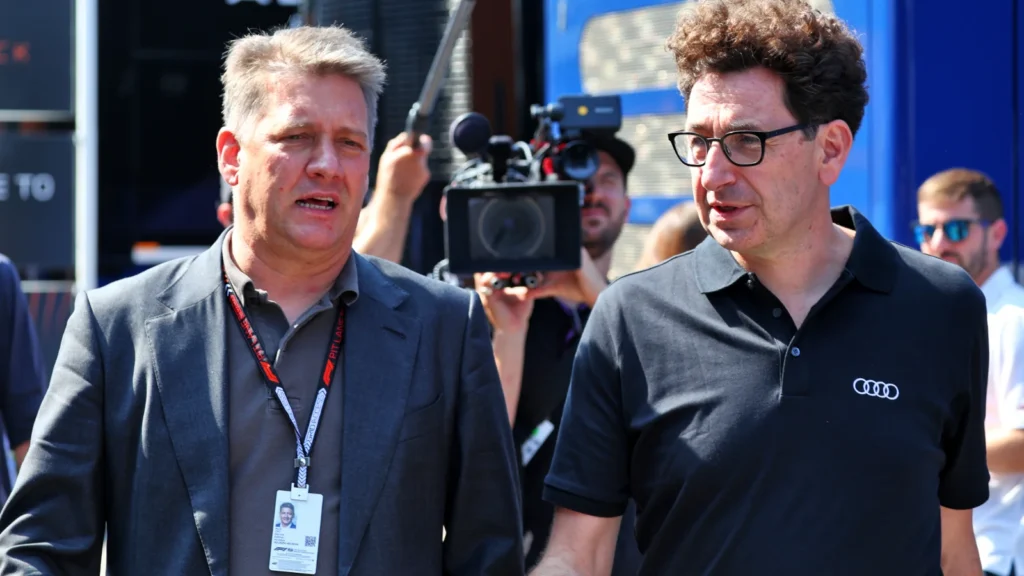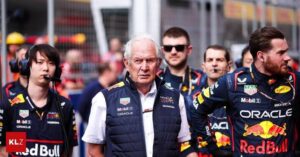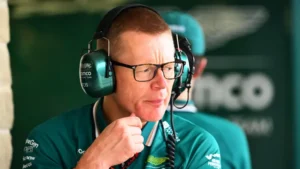BREAKING NEWS: Gernot Dollner appointed Mattia Binotto to head Audi’s F1 venture……Read more

Gernot Dollner appointed Mattia Binotto to head Audi’s F1 venture
Audi’s Formula 1 project has undergone significant changes in its management structure as it prepares to enter the sport as a power unit manufacturer in 2026. Gernot Dollner, Audi CEO, has been instrumental in these developments, expressing confidence in the brand’s long-term commitment to the sport despite Renault’s recent decision to stop producing engines for the new F1 regulations.
Renault, the parent company of Alpine, recently announced that it would cease developing power units for Formula 1’s 2026 engine regulations, opting instead to become a customer team. This move has caused some restructuring in the F1 power unit landscape, with Ford, in collaboration with Red Bull, and Audi stepping in as new manufacturers under the upcoming regulations.
Despite Renault’s withdrawal, Dollner emphasized that Audi’s decision to participate in Formula 1 remains unchanged, citing their long-term commitment to the sport. When asked if Renault’s exit had prompted any internal discussions about Audi reconsidering its F1 project, Dollner firmly dismissed such notions, stating that pulling the plug was not on the table.
Audi’s journey into Formula 1 involves the complete acquisition of Sauber, which currently competes as Alfa Romeo, and the German brand’s full control of the team is set to be finalized by January 2025. This move marks Audi’s official entry into the sport, following the signing of an agreement to become Sauber’s title sponsor and power unit supplier. Dollner, who now chairs Sauber’s board of directors, will be closely involved in the company’s Formula 1 operations moving forward.
A key highlight of Audi’s F1 preparations is the appointment of high-profile names to lead the venture. Mattia Binotto, the former Ferrari team principal, has been appointed as Sauber’s Chief Operating Officer, while Jonathan Wheatley, who previously held a prominent role at Red Bull Racing, has been brought in to head the team’s race operations. Dollner expressed satisfaction with these appointments, noting that the restructuring process, which began in July, has brought a strong leadership team to the project.
He praised Binotto and Wheatley for their expertise, highlighting the dual leadership model they will employ. Binotto will oversee corporate and project operations, including car development, while Wheatley will manage the team’s racetrack activities and serve as the spokesperson. Dollner believes this structure provides the perfect foundation for Audi’s future success in Formula 1.
One of Audi’s most significant challenges will be developing its own power unit for the 2026 season. Binotto, acknowledging the advantages that existing engine manufacturers will have, stressed the importance of Audi producing its own engine. He emphasized that being a full manufacturer—developing both chassis and power unit—was a critical element of Audi’s ambitions in Formula 1.
While admitting that the task ahead is daunting and requires a significant investment, Binotto expressed confidence in the people involved in the project and the support they have received. He stated that it will be up to the team to earn the trust of Audi’s leadership by delivering results.
Audi’s entry into Formula 1, coupled with its acquisition of Sauber and the appointment of experienced leadership, signals the brand’s determination to become a major player in the sport. Despite the challenges posed by developing a new power unit and integrating with Sauber’s existing operations, Audi remains committed to its goal of achieving success as both a chassis and engine manufacturer in the highly competitive world of Formula 1.





